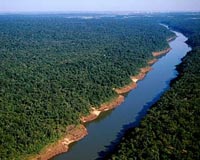 |
Ancon, Panama (SPX) Jun 30, 2010 Why are tropical forests so biologically rich? Smithsonian researchers have new evidence that the answer to one of life's great unsolved mysteries lies underground, according to a study published in the journal, Nature. "We've known for a long time that tree seedlings do not grow and survive well under their mothers or other adult trees of the same species," said Scott Mangan, postdoctoral fellow at the University of Wisconsin-Milwaukee and the Smithsonian Tropical Research Institute in Panama. "One explanation for the maintenance of the diversity of tropical trees is that adult trees harbor pests and diseases that harm seedlings of their own species more than they do seedlings of other species." The experiments show that underground organisms are key to the maintenance of species diversity and patterns of tree-species relative abundance. The detrimental effects of soil organisms from adult trees not only explain seedling growth and survival patterns, but moreover that these effects are much more severe for seedlings of rare species than for seedlings of common species. Mangan planted seedlings of five species under adults of each species in the forest and coupled that experiment with a greenhouse experiment in which he grew seedlings of each species in soil collected around the base of each of the other species. Consistent across experiments, Mangan and colleagues found that the ability of seedlings of a species to survive when grown in soil from the same species actually predicted how common or rare they are as adults. Their result closely mirrors results presented in Science magazine this week by Liza Comita and colleagues, based on a survey of survival of 30,000 tree seedlings-part of a major effort to understand forest dynamics worldwide sponsored, in part, by the HSBC Climate Partnership. "It's been more than 30 years since the idea that negative interactions between adults and seedlings of the same species may be driving diversity-the Janzen-Connell Hypothesis-was first proposed, and only now is this story really coming together," said co-author Allen Herre, staff scientist at STRI. "Two completely different approaches-analysis of long-term forest dynamics observations and direct experiments on Panama's Barro Colorado Island-are telling us to look for the answer under the ground. Scott's experiments provide a direct comparison across species of how much their seedlings suffer from a sort of 'self inhibition' mediated by these soil organisms." Biologists refer to soil as a "black box" because it is notoriously difficult to study a tangle of roots, bacteria, fungi, tiny insects and other creatures without isolating or changing them. Very similar results in the greenhouse and in the field reveal that plant interactions with soil biota alone-not nutrients, insects, mammals or above-ground diseases-are sufficiently powerful and specific to explain why multiple species co-exist and importantly the strength of those interactions can be measured and plant species that are most abundant are least influenced by the soil biota around their parents. "We have dealt yet another blow to the ailing Neutral Theory of Biodiversity, which is premised on the idea that all species are the same," said Herre. "These two publications provide strong evidence that there are stabilizing mechanisms that maintain diversity, and thus that neutral dynamics do not explain plant species diversity and abundance."
Share This Article With Planet Earth
Related Links Smithsonian Tropical Research Institute Forestry News - Global and Local News, Science and Application
 Soil-Borne Pathogens Drive Tree Diversity In Forests
Soil-Borne Pathogens Drive Tree Diversity In ForestsMilwaukee WI (SPX) Jun 30, 2010 What determines plant diversity in a forest? It's a question even Charles Darwin wanted to unravel. But most research into forest diversity demonstrates only patterns of species survival and abundance rather than the reason for them - until now. A team of researchers led by biologists at the University of Wisconsin-Milwaukee (UWM) has shown that soil-borne pathogens are one important mecha ... read more |
|
| The content herein, unless otherwise known to be public domain, are Copyright 1995-2010 - SpaceDaily. AFP and UPI Wire Stories are copyright Agence France-Presse and United Press International. ESA Portal Reports are copyright European Space Agency. All NASA sourced material is public domain. Additional copyrights may apply in whole or part to other bona fide parties. Advertising does not imply endorsement,agreement or approval of any opinions, statements or information provided by SpaceDaily on any Web page published or hosted by SpaceDaily. Privacy Statement |